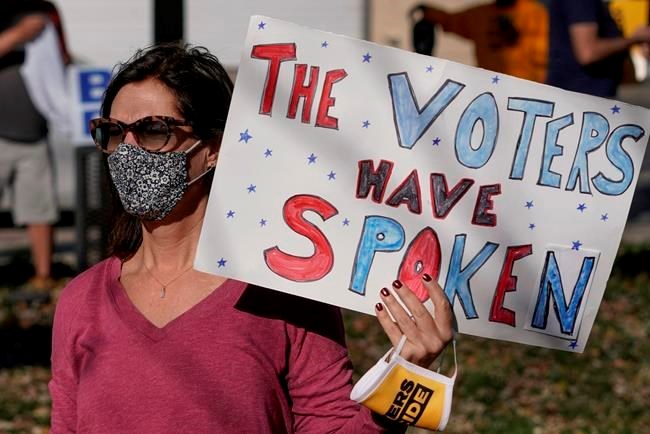MADISON, Wis. — A divided Wisconsin Supreme Court on Thursday refused to hear President Donald Trump’s lawsuit attempting to overturn his loss to Democrat Joe Biden in the battleground state, sidestepping a decision on the merits of the claims and instead ruling that the case must first wind its way through lower courts.
In another blow to Trump, two dissenting conservative justices questioned whether disqualifying more than 221,000 ballots as Trump wanted would be the proper remedy to the errors he alleged.
The defeat on a 4-3 ruling was the latest in a string of losses for Trump’s post-election lawsuits. Judges in multiple battleground states have rejected his claims of fraud or irregularities.
Trump asked the Wisconsin Supreme Court to disqualify more than 221,000 ballots in the state’s two biggest Democratic counties, alleging irregularities in the way absentee ballots were administered. His lawsuit echoed claims that were earlier rejected by election officials in those counties during a recount that barely affected Biden’s winning margin of about 20,700 votes.
Trump’s attorney Jim Troupis said he would immediately file the case in circuit court and expected to be back before the Supreme Court “very soon.”
“It was clear from their writings that the court recognizes the seriousness of these issues, and we look forward to taking the next step,” he said in a statement. Trump's team made the filing late Thursday evening.
In asking the conservative-controlled Wisconsin Supreme Court to take the case directly, Trump had argued that there wasn’t enough time to wage the legal battle by starting with a lower court, given the looming Dec. 14 date when presidential electors cast their votes.
Swing Justice Brian Hagedorn joined three liberal justices in denying the petition without weighing in on Trump's allegations. Hagedorn said the law was clear that Trump must start his lawsuit in lower courts where factual disputes can be worked out.
“We do well as a judicial body to abide by time-tested judicial norms, even — and maybe especially — in high profile cases,” Hagedorn wrote. “Following this law is not disregarding our duty, as some of my colleagues suggest. It is following the law.”
Trump filed a similar lawsuit in federal court on Wednesday.
Chief Justice Patience Roggensack, in a dissent where she was joined by Justice Annette Ziegler, said she would have taken the case and referred it to lower courts for factual findings, which could then be reported back to the Supreme Court for a ruling.
But she also questioned whether disqualifying ballots was appropriate, saying that "may be out of reach for a number of reasons.”
Conservative Justice Rebecca Bradley wrote that the court “forsakes its duty” by not determining whether elections officials complied with the law and the inaction will undermine the public's confidence in elections. Allowing the elections commission to make the law governing elections would be a “death blow to democracy,” she wrote.
“While some will either celebrate or decry the court's inaction based upon the impact on their preferred candidate, the importance of this case transcends the results of this particular election,” she wrote in a dissent joined by Roggensack and Ziegler. “The majority's failure to act leaves an indelible stain on our most recent election.”
Democratic Gov. Tony Evers praised the decision.
“I was frankly amazed that it was not unanimous," Evers said.
Trump's lawsuit challenged procedures that have been in place for years and never been found to be illegal.
He claimed there were thousands of absentee ballots without a written application on file. He argued that the electronic log created when a voter requests a ballot online — the way the vast majority are requested — doesn’t meet the letter of the law.
He also challenged ballots where election clerks filled in missing address information on the certification envelope where the ballot is inserted — a practice that has long been accepted and that the state elections commission told clerks was OK.
Trump also challenged absentee ballots where voters declared themselves to be “indefinitely confined,” a status that exempts them from having to show photo identification to cast a ballot, and one that was used much more heavily this year due to the pandemic. The Wisconsin Supreme Court in March ruled that it was up to individual voters to determine their status.
Roggensack, the chief justice, appointed Reserve Judge Stephen Simanek of Racine County to hear the case at the circuit court level. Simanek retired in 2010.
The court late Thursday also declined to hear a lawsuit brought by a Wisconsin resident, Dean Mueller, that argued that ballots placed in drop boxes are illegal and must not be counted. The court's brief order included a single line noting Roggensack, Ziegler and Bradley all dissented with the denial.
One other lawsuit filed by conservatives is still pending with the court seeking to invalidate ballots. In federal court, there is Trump’s lawsuit and another one with similar claims from Sidney Powell, a conservative attorney who was removed from Trump’s legal team.
Wisconsin this week certified Biden’s victory, setting the stage for a Democratic slate of electors chosen earlier to cast the state’s 10 electoral votes for him.
Scott Bauer, The Associated Press



